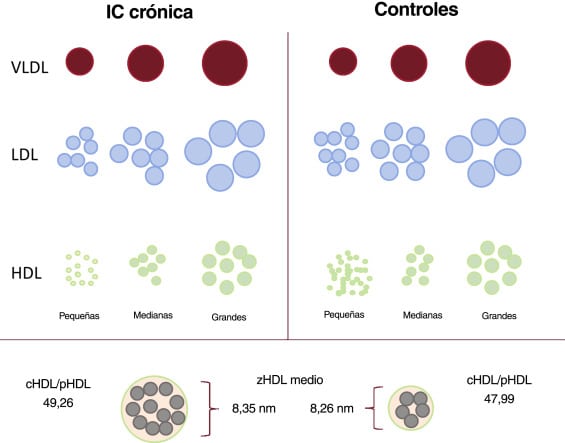Liposcale Test allows for the comprehensive characterization of the lipid composition, size, and number of particles of different lipoproteins.
Chronic heart failure affects millions of people worldwide, representing one of the leading causes of morbidity and mortality in modern societies. Traditionally, the treatment and management of this condition have focused on improving symptoms and the quality of life of patients. However, recent advances in medical research are opening new avenues to address the underlying causes of the disease. In this context, we are going to present a study published in the Spanish Journal of Cardiology, which highlights the crucial role of lipoproteins in the pathology of chronic heart failure.
Using Nuclear Magnetic Resonance spectroscopy (NMR) technology, this study compared the lipoprotein profile of patients with chronic heart failure to a matched control group. The results revealed significant differences, with affected patients showing lower levels of total cholesterol, LDL (low-density lipoproteins), and HDL (high-density lipoproteins), and a notable reduction in the small HDL subfraction. Additionally, it was observed that the size of these lipoprotein particles was significantly larger in patients with heart failure.
This discovery offers a deeper understanding of the metabolic changes associated with chronic heart failure, which could lead to the development of new diagnostic and treatment strategies. Furthermore, it highlights the potential relevance of lipoproteins as biomarkers for assessing the risk and severity of the disease. Finally, it demonstrates the ability of NMR technology to provide detailed insights into the composition and function of lipoproteins in the context of cardiovascular disease.
Therefore, the study opens up new perspectives in the fight against chronic heart failure, a disease that continues to challenge the medical and scientific community. As we advance our understanding of the underlying mechanisms of this condition, it is essential to have advanced technologies such as NMR, which allows for deeper and more precise investigations. This approach will not only improve our knowledge of heart failure but also bring patients closer to more effective and personalized treatments.
If you want to read the article: Teis, A., Castelblanco, E., Cediel, G., Amigó, N., Julve, J., Ribalta, J., … & Bayés-Genís, A. (2022). Perfil lipoproteico por espectroscopia nuclear magnética en pacientes con insuficiencia cardiaca crónica comparado con controles emparejados. Revista Española de Cardiología, 75(11), 867-876.



